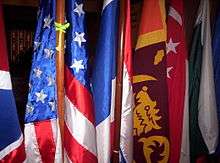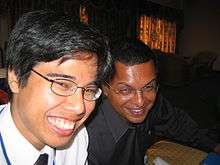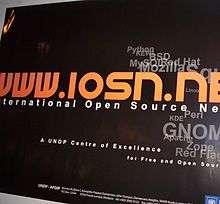FOSSAP
The Free and Open Source Software Asia-Pacific Consultation, or FOSSAP, was an event promoting free and open source software held twice in Asia, in 2004 and 2005. The first event was held in March 2004 in Kuala Lumpur, Malaysia, while the second event was held in September 2005 in Siem Reap, Cambodia.
Organisers

FOSSAP was organised by the International Open Source Network, which is part of the United Nations Development Programme's Asia-Pacific Development Information Programme. FOSSAP-II was sponsored by UNDP-APDIP with Intel Corporation as its co-sponsors. Local hosts were the National ICT Development Authority (NiDA) of Cambodia and the Open Forum, Cambodia.
Goals
According to the organisers, FOSSAP II was aimed at providing "an effective policy-level platform for the exchange of information and experiences in the use of Free and Open Source Software (FOSS) for development". FOSS has earlier been described as FLOSS, or Free/Libre and Open Source Software.
They also argued that "there is a growing need for awareness on the benefits of FOSS, assistance with formulation of national policies, and case studies of FOSS implementation. This consultation sees its primary target as policy-makers "who can influence national Information and Communication Technology (ICT) policies".
FOSSAP-II
FOSSAP-II was a three-day event, held September 1–3, 2005, in Siem Reap. It had participants from twenty countries in Asia, including FOSS campaigners, supporters, funders, software developers and government officials. The focus was on capacity building, localisation, development paradigms of Free/Libre and Open Source Software (FLOSS), open content, and e-governance.

Cambodian deputy prime minister Sok An, in a speech delivered on his behalf, argued that Free and Open Source Software could help a country like Cambodia to have a "lot of savings in license fees", make software readily available locally and reduce usage costs drastically, eliminate software piracy, and enable Cambodian students to closely study the software code and "understand its behaviour".
Richard Stallman, the founder of the Free Software Foundation, said at the end of the conference: "People here represent a broad spectrum in beliefs and their goals. There are people from both the Free Software and Open Source movements. It looks like we can work together and make programs that ensure users can be in control of the software they use. I've seen a lot of useful things come up here."
Software localisation—or translating software into local languages—was another issue strongly discussed. There were interesting issues that came up about localisation of software into the Khmer language. One of the suggestions to come up was that FOSS needed its "global ambassador" to promote its case.

Participants came from Bangladesh including the Bengal Linux Project; Myanmar and the Burma IT Project; Cambodia including its National ICT Development Authority (NiDA) and the Open Forum Cambodia; China including the Chinese Co-create Association; Fiji, Hong Kong, India, Indonesia, Iran, Laos, Malaysia, Mongolia, Nepal, FOSSFP Free and Open Source Software Foundation of Pakistan, the Philippines, Singapore, Sri Lanka, Thailand, and Vietnam. Other participants came from the United Nations Development Programme, the Uniced, the Free Software Foundation, Intel, etc.
Sessions looked at FLOSS in government and the public sector, case studies of FLOSS in education, FLOSS in ICT4D, or Information and Communication Technologies for Development, government-lead community initiatives, and FLOSS community initiatives led by GNU/Linux user groups.
There were special parallel sessions to discuss FLOSS and policy, FLOSS and capacity building, FLOSS and localisation, FLOSS and open standards, FLOSS and development practise, FLOSS and e-government, and software localisation teams in the FLOSS world.
